
Journal of Food Safety and Food Quality-Archiv fur Lebensmittelhygiene
Scope & Guideline
Preserving the Legacy of Food Hygiene Research Since 1959.
Introduction
Aims and Scopes
- Food Safety and Microbiology:
Research on the microbiological quality of food products, including studies on the presence of pathogens, biofilm formation, and the effectiveness of decontamination methods. - Food Quality and Nutritional Assessment:
Investigations into the physicochemical properties, nutritional values, and sensory characteristics of various food items, aiming to enhance food quality and consumer acceptance. - Innovative Processing Techniques:
Exploration of new processing methods, such as ultrasound, UV-C light, and hybrid cooking techniques, to improve food safety and quality attributes. - Natural Preservatives and Additives:
Studies focusing on the use of natural substances like essential oils, probiotics, and antioxidants to enhance food safety and shelf-life. - Traditional and Functional Foods:
Research on traditional food products, their health benefits, and the incorporation of functional ingredients to improve nutritional value. - Environmental and Ethical Considerations:
Assessment of food safety practices, including the impact of environmental factors on food quality and the ethical implications of food production.
Trending and Emerging
- Application of Artificial Intelligence and Modelling:
Emerging interest in using artificial intelligence and fuzzy logic models to predict food safety parameters and improve processing techniques. - Probiotic and Functional Foods:
A rising trend in the investigation of probiotic cultures and their effects on food quality, health benefits, and consumer preferences. - Natural and Plant-Based Preservatives:
Growing research on the effectiveness of natural preservatives from plant sources, reflecting the industry's shift towards cleaner labels and sustainability. - Impact of Environmental Factors on Food Quality:
Increasing focus on how environmental conditions, such as seasonal variations, affect food safety and quality, particularly in primary food sources. - Consumer Preferences and Sensory Analysis:
Heightened emphasis on understanding consumer preferences and sensory properties of foods, which is critical for product development and marketing.
Declining or Waning
- Chemical Food Additives:
Research on synthetic chemical additives has decreased as there is a growing preference for natural alternatives and a heightened consumer awareness regarding food safety. - Traditional Fermentation Techniques:
Although still relevant, studies specifically focusing on traditional fermentation methods have become less frequent as researchers explore more innovative and modern approaches. - General Food Processing Methods:
The emphasis on conventional food processing techniques is waning, with a shift towards more specific and advanced methodologies that promise better safety and quality outcomes. - Microbial Contamination in Processed Foods:
There is a noticeable decline in studies solely focused on microbial contamination in processed foods, as the journal's scope has expanded to include broader quality assessments and innovative interventions.
Similar Journals

CZECH JOURNAL OF FOOD SCIENCES
Exploring Innovative Solutions for Food Safety and TechnologyCzech Journal of Food Sciences is a premier publication in the field of food science, disseminating vital research since its inception in 1999 and transitioning to Open Access in 2007. Published by the Czech Academy Agricultural Sciences, this journal facilitates the exchange of knowledge among researchers, professionals, and students dedicated to advancing the understanding of food systems, safety, and technology. With an ISSN of 1212-1800 and an E-ISSN of 1805-9317, it holds a respectable position with a Q3 ranking in the Food Science category for 2023, illustrating its commitment to high-quality research despite its Scopus rank of 209 out of 389, situated in the 46th percentile. Located in the heart of the Czech Republic, at TESNOV 17, PRAGUE 117 05, this journal serves as an essential resource for those involved in agricultural and biological sciences, paving the way for innovative discoveries and applications in food science.

Journal of Food and Nutrition Research
Bridging Research and Real-World Nutrition SolutionsJournal of Food and Nutrition Research, published by the VUP FOOD RESEARCH INST in Bratislava, Slovakia, serves as a vital platform for disseminating cutting-edge research in the fields of food science and nutrition. With an ISSN of 1336-8672 and an E-ISSN of 1338-4260, this journal emphasizes the importance of interdisciplinary approaches to address contemporary challenges related to food quality, dietary practices, and nutritional health. Notably recognized in the 2023 Scopus rankings, the journal is classified in Q3 quartiles for both Food Science and Nutrition & Dietetics, providing a forum for researchers aiming to enhance knowledge and practices within these domains. Those engaged in academia and industry will find the journal invaluable for its comprehensive scope, which covers novel food technologies, nutrition interventions, and the implications of dietary behaviors. Though not open access, the journal is dedicated to enriching the academic conversation and contributing to advancements in public health and nutrition policies.
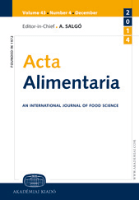
ACTA ALIMENTARIA
Advancing food science through rigorous research.ACTA ALIMENTARIA is a renowned journal in the field of food science, published by AKADEMIAI KIADO ZRT, based in Hungary. Since its inception in 1973, it has served as a vital platform for disseminating high-quality research on food chemistry, microbiology, nutrition, and technology, contributing significantly to the advancement of knowledge in the agricultural and biological sciences. Currently classified in the Q3 quartile of the 2023 Food Science category, the journal is positioned to address pressing issues pertaining to food safety, quality, and sustainability, making it an invaluable resource for researchers, professionals, and students alike. Although it does not currently offer open access, the journal maintains a strong reputation with a readership keenly interested in the latest developments in food science. With a Scopus rank placing it in the 38th percentile of its category, ACTA ALIMENTARIA continues to be a pivotal reference for those engaged in food research and innovation.
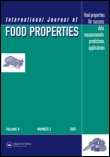
INTERNATIONAL JOURNAL OF FOOD PROPERTIES
Advancing knowledge in food science.INTERNATIONAL JOURNAL OF FOOD PROPERTIES, published by TAYLOR & FRANCIS INC, is a leading platform for disseminating high-quality research in the field of food science. With an ISSN of 1094-2912 and E-ISSN of 1532-2386, this journal has been committed to open access since 2018, ensuring that groundbreaking studies are readily available to global audiences. The journal has steadily gained recognition for its contribution to the discipline, achieving a Q2 ranking in Food Science and placing in the 68th percentile among its peers according to Scopus metrics. Covering a wide array of topics related to the properties and applications of food, it serves as a valuable resource for researchers, professionals, and students alike. With coverage extending from 1998 to 2024, the journal continually seeks to advance knowledge and foster innovation within the food science community, making it a pivotal publication for anyone serious about this vital field.

EFSA Journal
Championing excellence in animal and food research.EFSA Journal, published by Wiley, stands as a premier open-access platform dedicated to the fields of animal science, food science, and veterinary studies, among others. Since its inception in 2003, this journal has contributed significantly to the dissemination of high-quality research, fostering collaboration and innovation across various disciplines. With an impressive impact highlighted by its Q1 quartile rankings in multiple categories including Animal Science, Food Science, and Parasitology, the journal upholds rigorous standards and a commitment to advancing knowledge. Researchers and professionals benefit from the wide-ranging scope and high visibility of published works, thereby enhancing their scholarly impact. For academics seeking excellence in open-access publishing, EFSA Journal represents a vital resource from the United Kingdom, ensuring that critical insights into food safety, biotechnology, and environmental sciences reach a global audience.
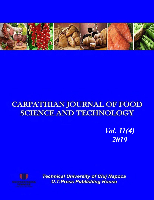
Carpathian Journal of Food Science and Technology
Advancing Food Science Innovation in the CarpathiansCarpathian Journal of Food Science and Technology, a distinguished publication from the NORTH UNIV CENTER BAIA MARE, has been a pivotal platform for disseminating groundbreaking research in the field of food science since its inception in 2009. With an ISSN of 2066-6845 and an E-ISSN of 2344-5459, this Open Access journal aims to promote knowledge and innovation, offering unrestricted access to its content, thereby enhancing visibility for authors and facilitating a wider readership. Based in Romania, the journal plays a crucial role in advancing scientific inquiry within the agricultural and biological sciences, particularly focusing on contemporary food science issues. As it continues its convergence through 2024, the journal currently holds a Q4 ranking in the Food Science category, allowing it to carve out a unique niche within the academic community despite its current Scopus percentile ranking of 19th. Scholars, researchers, and students in the field will find the journal an invaluable resource for the latest advancements and discussions, making it an essential addition to their academic pursuits.
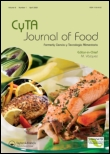
CyTA-Journal of Food
Elevating food research for a healthier tomorrow.CyTA-Journal of Food is a prestigious academic journal published by TAYLOR & FRANCIS LTD, dedicated to advancing the field of food science and technology through the dissemination of innovative research and practical knowledge. With an ISSN of 1947-6337 and an E-ISSN of 1947-6345, this journal stands out with its strong impact factor and is currently placed in the Q2 quartile across multiple categories, including Chemical Engineering, Chemistry, and Food Science, making it a vital resource for researchers and professionals alike. The journal has been an integral part of the academic community since its inception in 2009, and continues to publish cutting-edge articles through to 2024. Its alignment with Scopus ranks further signifies its influence, notably achieving 67th percentile in Industrial and Manufacturing Engineering. As an Open Access journal, it ensures widespread accessibility to its valuable content, promoting collaboration and knowledge sharing among scientists, engineers, and students dedicated to enhancing food safety, quality, and sustainability.
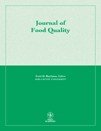
JOURNAL OF FOOD QUALITY
Empowering Food Professionals with Cutting-Edge ResearchThe Journal of Food Quality, an esteemed publication under Wiley-Hindawi, stands as a vital resource in the dynamic field of Food Science, established since 1977 and operating under an Open Access model since 2017. With its seat in the United Kingdom, this journal focuses on delivering high-quality research and insights pertaining to food safety, risk management, and quality assurance, reflected in its impressive Q2 ranking in both Food Science and Safety, Risk, Reliability and Quality categories in 2023. Researchers and professionals will find the journal’s contributions indispensable, particularly given its Scopus rankings that place it in the top echelons of its fields, highlighting its impact and relevance. By fostering an environment of knowledge sharing, the Journal of Food Quality not only enhances academic dialogue but also supports innovation and best practices in food research and industry applications.

JOURNAL OF THE JAPANESE SOCIETY FOR FOOD SCIENCE AND TECHNOLOGY-NIPPON SHOKUHIN KAGAKU KOGAKU KAISHI
Innovating Together: Bridging Food Science and TechnologyWelcome to the JOURNAL OF THE JAPANESE SOCIETY FOR FOOD SCIENCE AND TECHNOLOGY-NIPPON SHOKUHIN KAGAKU KOGAKU KAISHI, a pivotal platform for the advancement of food science and technology. Published by the Japan Society for Food Science and Technology, this esteemed journal has been contributing to the field since 1995 and continues to publish innovative research and reviews that foster knowledge and collaboration among researchers, professionals, and students interested in food science. Although it currently holds a Q4 ranking within the Food Science category, the journal's commitment to disseminating valuable insights showcases its potential as a resource for emerging trends and applications in food technology. While it does not offer open access options, it maintains a rigorous peer-review process to ensure the quality of its content. As this journal progresses into its convergence years through 2024, it remains an essential resource for those passionate about exploring the intersections of food science and technology in Japan and beyond.
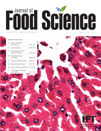
JOURNAL OF FOOD SCIENCE
Championing the Quest for Food Integrity and SafetyJOURNAL OF FOOD SCIENCE, published by Wiley, is a premier journal dedicated to advancing the field of food science, bridging the gap between fundamental research and practical application. With an impressive impact factor reflecting its authoritative status, the journal is ranked in the Q1 quartile for Food Science in 2023 and boasts a Scopus ranking of #71 out of 389, placing it in the 81st percentile within Agricultural and Biological Sciences. First launched in 1936, the journal continues to serve as an essential platform for researchers, professionals, and students to disseminate innovative studies and reviews that address critical issues in food quality, safety, and technology. While not currently offering open access, its rigorous peer-review process ensures the dissemination of high-quality and impactful research. Researchers engaged in the vital disciplines of food science will find this journal indispensable for keeping abreast of cutting-edge developments in the field.